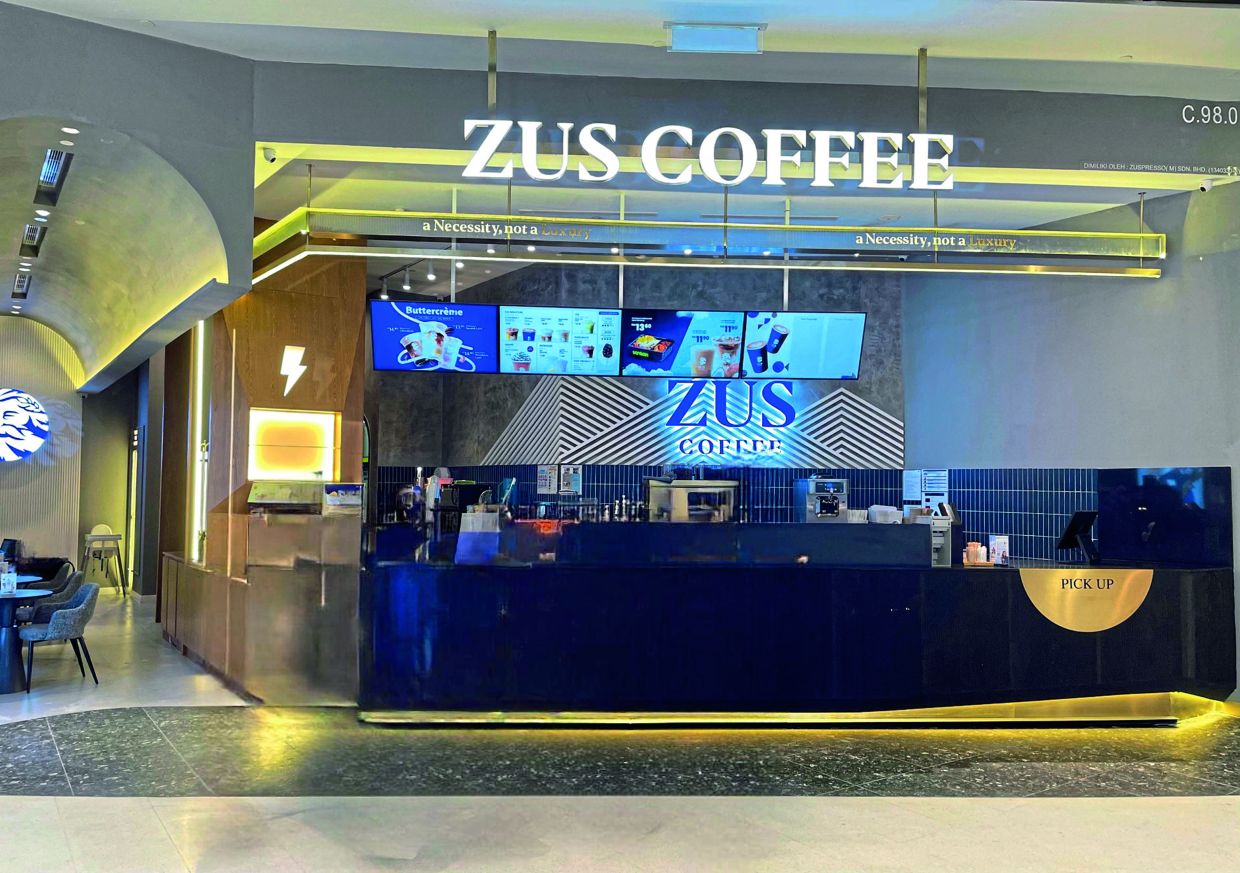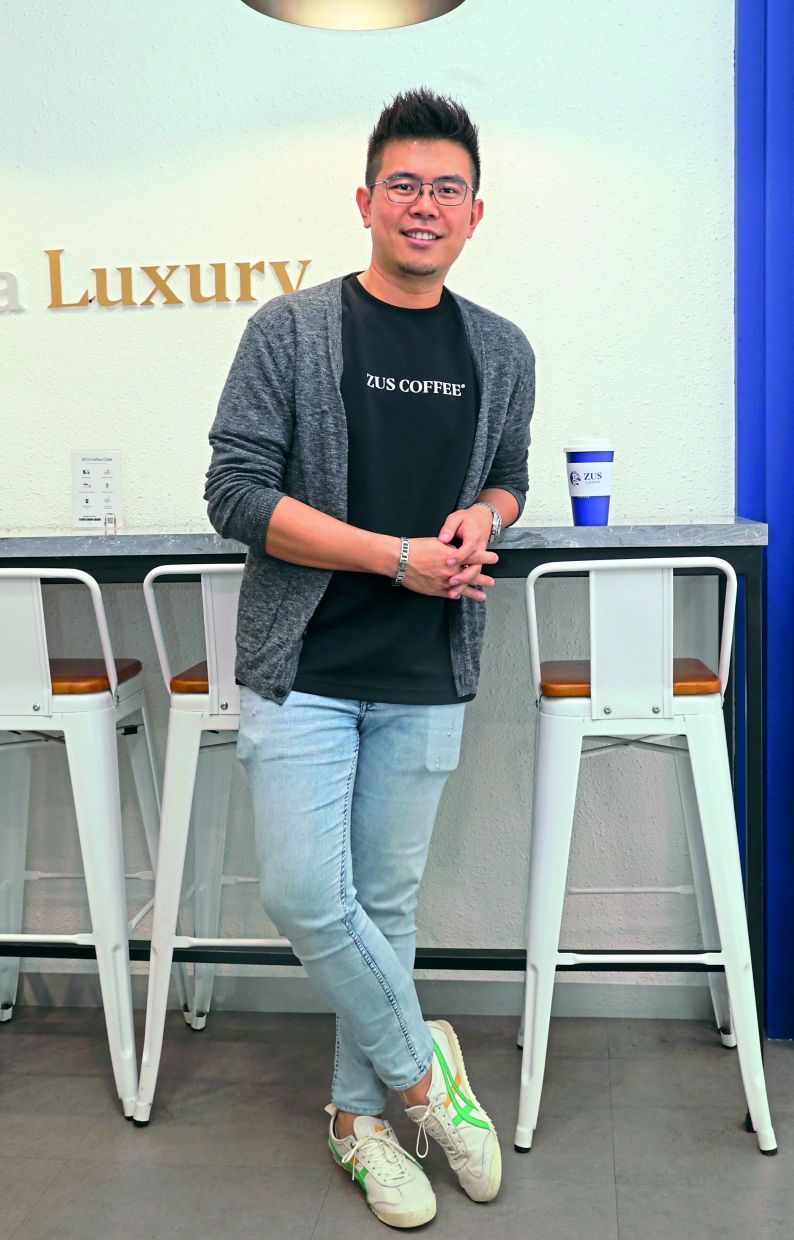The brand's first kiosk outlet at Binjai 8. - ZUS Coffee
IT can be hard to wrap one’s brain around just how ZUS Coffee went from a relatively unknown name with a single coffee kiosk to an ubiquitous chain with 330 outlets around the country in just over four years.
As we sit down over a cup of coffee at ZUS Coffee’s Bandar Sunway Metro outpost, its chief operating officer (COO) Venon Tian mentions that the company had just opened a stylish outlet at The Exchange TRX. He also casually shares that this December alone will see a new outlet launch almost every other day of the month.
Expansion at such a breakneck pace may faze some, but for ZUS Coffee, speed has been the name of the game from its inception in late 2019.
“When we first started, it was very much about fast coffee,” says Tian. “Our business model was aimed at making the pickup-and-delivery model much more available and accessible to people.”
At the time, coffee shops commonly served as ‘third places’ which offered invitingly furnished spaces to dwell outside of the home and the workplace. ZUS Coffee, on the other hand, was geared towards a grab-and-go concept in its early days, equipping its stores with pick-up windows that provided a convenient way for customers to get their caffeine fix, particularly during the height of the pandemic.
“During the MCOs, people didn’t want to go into the store, but they could collect their coffee through the windows. So we built the entire business based on that and even now some stores still have pick-up windows, though of course, now we have a range of other outlet formats including more premium sit-down locations,” he notes.
‘A necessity, not a luxury’
The first outlet, Tian recalls, was a 200-odd square foot kiosk at Binjai 8 in the KLCC area. From there, the business started experimenting with different locations within residential area shopping malls. Few could have predicted a global health crisis emerging only a few months into the business.
“When we first began, it was tough, because we were trying to change consumer behaviour and to familiarise them with this business model,” he remembers. “But once MCO kicked in, it became a very natural thing in the sense that you were buying food online, ordering online, everything was delivered, so we took that opportunity to really scale during that time.”
In a market saturated with coffee options, ZUS Coffee honed in on a gap that remained largely unfilled. There were the lower-priced kopitiams and convenience stores, and there were the familiar premium-mass market chains as well as specialty independent coffee shops, but few places were serving consumers in the middle of the spectrum.
“The target for us was to reach that gap with a price point of RM6-RM10. We call it ‘a necessity, not a luxury’,” he explains. “It was about: How do we make good coffee affordable and available to everyone while also making interesting and exciting flavours?”
ZUS Coffee’s top sellers include the creamy Spanish Latté, the robust CEO Latté and the lemon-infused, sparkling coffee mocktail Thunder, but its menu is continually refreshed to introduce unique beverages such as the Ice Shaken Osmanthus Orange Espresso, the Sakura Rose Frappe and the Cheese Crème Latté.
The range of drink concoctions and colourful combinations regularly rolled out are known to push the envelope creatively, but the COO reveals that crafting the menu is often more science than it is art.
Powered by tech
“Of course, we look at the trends and take into account what Malaysians like in general, but over the years we have moved towards utilising whatever data we have to help us to build our next best product,” Tian states.
Through its app, which facilitates ordering, pick-up and delivery, the business is able to gather information about customers’ tastes and preferences, which is then factored into the creation of future products or the improvement of existing menu items.
“When we first started, it was more based on gut feeling and what was popular at the time, but later on, it became very much data-based,” he adds. “On a granular level, we can observe it to the extent of the type of ingredients being used.
“For instance, if we find that 60% of our customers like caramel, the next drink we make will be based on that flavour. With the kind of beans we use, we would look into who orders what — when and how often — and that will help us determine how much customers like a variety.”
ZUS Coffee’s tech-first approach to coffee is in fact one of its defining features. The brand’s enthusiastic embrace of technology was inspired by China’s Luckin Coffee chain, which emphasises quick, convenient and affordable coffee using an app-based ordering and pick-up system.
Impressed by the efficiency enabled by the use of technology, ZUS Coffee’s founding heads channelled the principles into their ‘fast coffee’ model. “To us, the tech aspect of the app felt like a no-brainer,” he shares.
Prior to founding ZUS Coffee, Tian and co-founder Ian Chua both had backgrounds in running start-ups, and were familiar with the tech space. “We started building the app even before we did the store, and the app was actually much easier for us because we had no experience in running an F&B business. ”
Solid grounds
Four years on, the coffee-tech concept has proven to be more than sound, considering the brand’s widespread popularity and presence. By the end of 2023, ZUS Coffee will have reached a total of 360 locations in Malaysia, with plans to open 250 more next year.
Following the announcement that Choi Garden restaurant group, led by Filipino billionaire Frank Lao, had acquired a 35% stake in the company, the chain launched its first international outlet this past September in the Philippines and will cap off the year with five locations in the country in total.
Looking towards the new year, Tian tells us that the company hopes to enter markets in other countries in South-East Asia, though right now the main focus is on Malaysia and the Philippines.
“We are targeting 100 more stores in the Philippines for 2024, and besides the coffee shops themselves, we are moving into a different vertical and launching more merchandise such as clothing, tumblers and keychains, as well as canned drinks and instant coffee,” he says.
“We’ll be heading into those segments and transitioning to become less of a coffee shop chain and more of a holistic coffee brand.”
With an exponentially expanding business encompassing 3,000 employees, building a strong foundation and organisational framework is undoubtedly crucial. “I would say we do have a very comprehensive structure,” he acknowledges when asked how this rapid growth is sustained.
“At the HQ level we have different departments with their own specialisations. In addition to the baristas, supervisors and the store managers, we also have district managers and a VP of operations that oversee everything. It’s quite a complex system but that’s what helps us to grow so quickly and we wouldn’t be able to do it without these people.”
If you had asked Tian four years ago if he expected ZUS Coffee to reach the scale and size it has today, the answer would have been less than certain. “When we first started, sure, we hoped to scale, but we didn’t know what the reception would be like. We were very much learning on a day-to-day basis,” he says.
“We only started to grow and do more as we went along. People would tell us we were crazy for targeting this many stores in a year, but constantly pushing boundaries is how we do things here.”
This article first appeared in Star Biz7 weekly edition.
The newly opened location at The Exchange TRX. - ZUS Coffee
The brand's first kiosk outlet at Binjai 8. - ZUS Coffee
Tian says constantly pushing boundaries is how ZUS Coffee does things
ART CHEN/The Star








